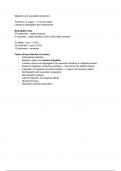Class notes
Migration & Population Dynamics: samenvatting hoorcolleges
- Course
- Institution
Dit document bevat een samenvatting van alle hoorcolleges Migration & Population Dynamics uit het jaar 2022/2023 (het document bevat dus geen expliciete literatuur samenvattingen). Het gaat om de volgende colleges: Lecture 1 Population Lecture 2 International Migration Lecture 3 reception o...
[Show more]



